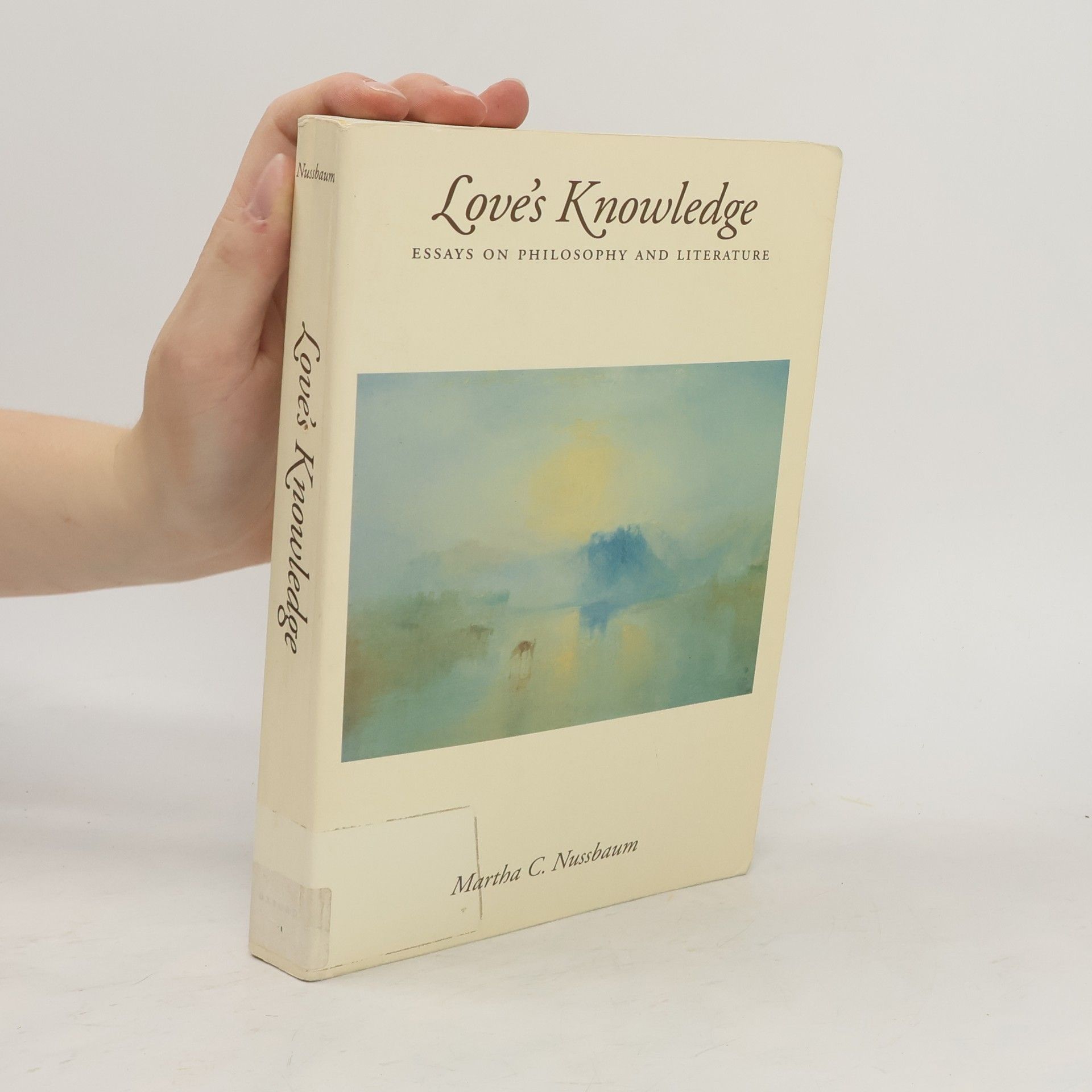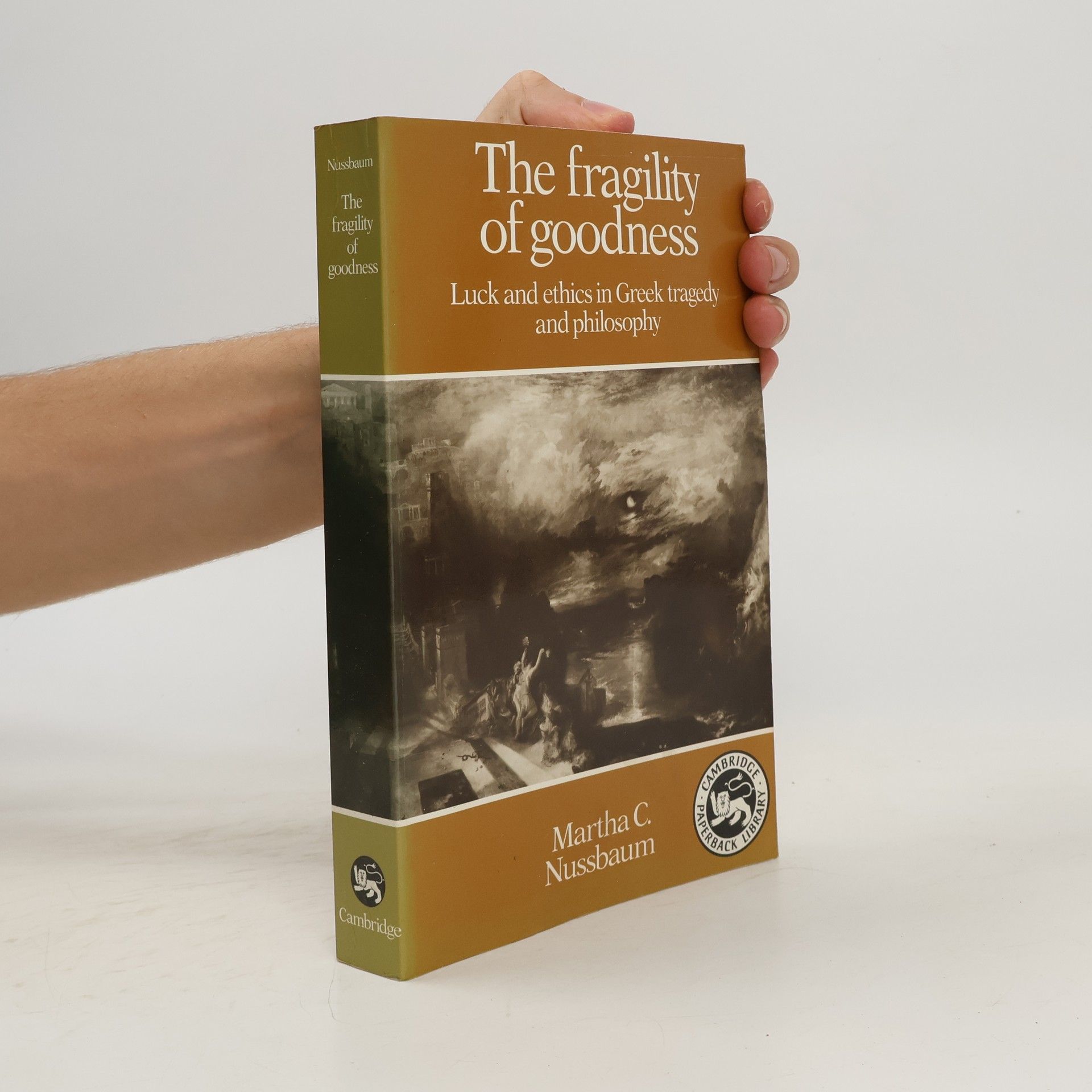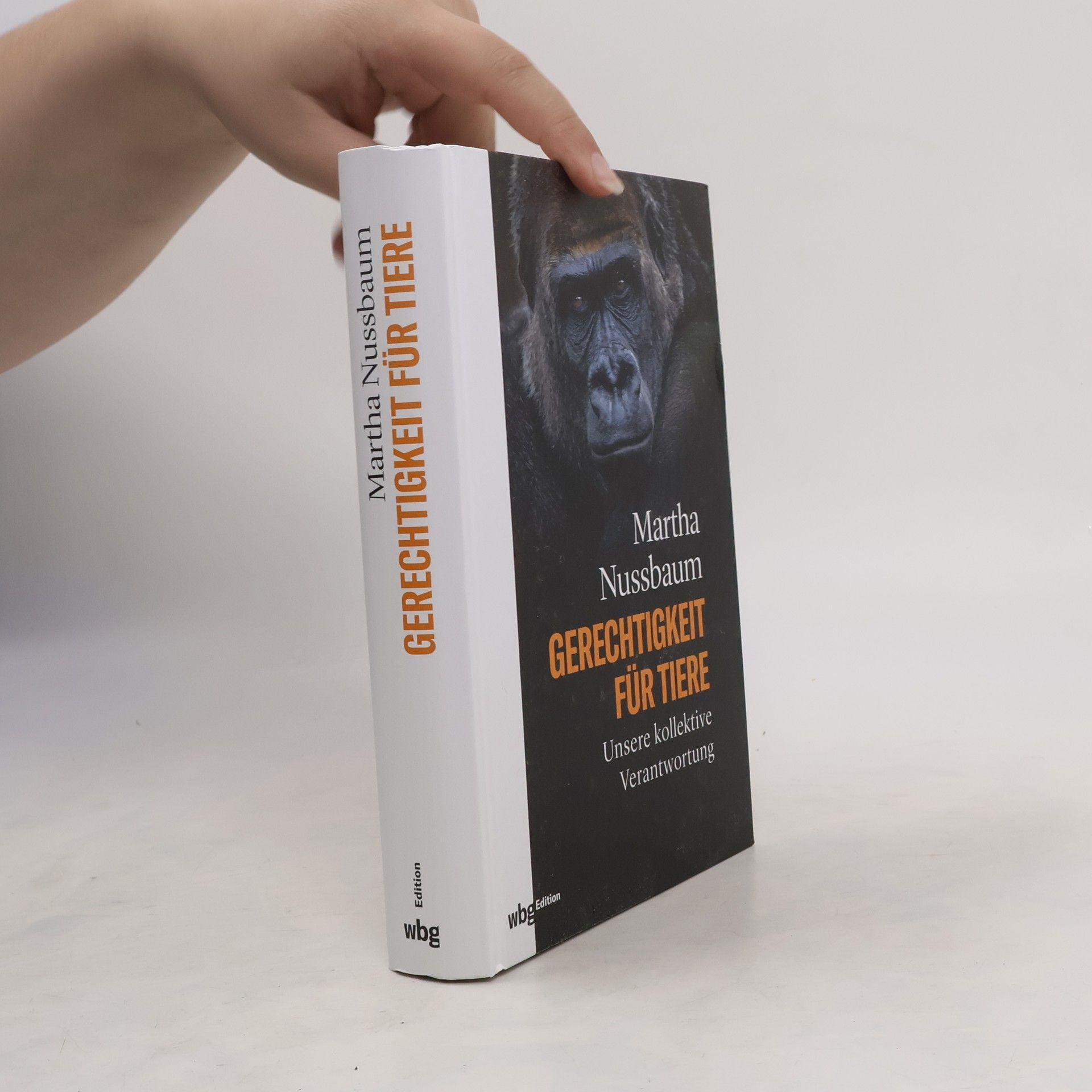From renowned philosopher Martha C. Nussbaum, a revolutionary exploration of animal rights, ethics, and law.
Martha Nussbaum Book order (chronological)
Martha C. Nussbaum is a professor at the University of Chicago, affiliated with the Law School and the Philosophy Department. Her work delves deeply into ethics, political philosophy, and psychology, often exploring how individuals can lead flourishing lives within their societies. Nussbaum is renowned for her ability to connect ancient philosophical ideas with contemporary issues, emphasizing empathy, compassion, and the development of human capabilities as foundational to a just society. Her approach is characterized by rigorous argumentation and a commitment to applying philosophical concepts to real-world challenges.






Ein dringender Appell zum Schutz aller Tiere von der berühmten Philosophin. Weltweit sind Tiere in Not, sei es durch Zerstörung ihrer Lebensräume, industrielle Tierhaltung, Wilderei oder Vernachlässigung von Haustieren. Tiere erleiden täglich Ungerechtigkeit und Grausamkeit durch unsere Hände. Martha Nussbaum entwickelt ausgehend von ihrem Fähigkeiten-Ansatz eine neue philosophische, juristische und moralische Grundlage zum Schutz der Tiere. Sie schildert das Leben von Tieren mit Staunen, Ehrfurcht und Mitgefühl und weist den Weg in eine Welt, in der wir Menschen Freunde der Tiere sind und nicht Ausbeuter. Nussbaums Ansatz wird auf die Tierwelt ausgeweitet und bietet ein Handbuch für Veränderungen in Politik und Recht sowie einen ehrlichen Ratgeber für die ethische Koexistenz mit allen Lebewesen. Sie setzt sich kritisch mit verschiedenen Strömungen der Tierethik auseinander und erklärt eindringlich, warum wir Verantwortung für die artenreiche Welt übernehmen müssen. Nussbaum schärft unseren Blick dafür, was wir unseren nicht-menschlichen Mitgeschöpfen schulden, und entwickelt einen Handlungsplan, um ihnen zu helfen. Jedes Tier muss die Chance haben, auf seine eigene Weise zu gedeihen, und wir haben die Pflicht, uns dem Leid der Tiere zu stellen und es zu beseitigen. Ihre Theorie ist ein dringender Aufruf zum Handeln und ein Ratgeber für Veränderungen, um unserer ethischen Verantwortung gerecht zu werden.
From a leading philosopher and Berggruen Prize winner, this work critically examines the cosmopolitan ideal from ancient Greece and Rome to today. The tradition begins with the Greek Cynic Diogenes, who identified as a citizen of the world, emphasizing the equal worth of all humans over lineage or social class. Nussbaum explores this "noble but flawed" vision of world citizenship through figures like Grotius, Smith, and contemporary thinkers. She addresses inherent tensions within the ideal, which posits that moral personality can be complete without external aids, while reality shows that meeting basic material needs is essential for realizing dignity. Given widespread material want, social inequities faced by individuals with disabilities, conflicting beliefs in pluralistic societies, and challenges posed by migration and asylum seekers, Nussbaum questions what political principles we should adopt. She applies her Capabilities Approach to these issues and extends her focus to include the moral claims of nonhuman animals and the environment. The insight that politics should regard all humans as equal and valuable beyond price informs much of modern Western political thought. This work encourages a focus on our shared humanity rather than divisions.
A ground breaking exploration of sexual violence by one of our most celebrated experts in law and philosophy
Boston Review Forum: On Anger
- 160 pages
- 6 hours of reading
Anger looms large in our public lives. Should it?Reflecting on two millennia of debates about the value of anger, Agnes Callard contends that efforts to distinguish righteous forms of anger from unjust vengeance, or appropriate responses to wrongdoing from inappropriate ones, are misguided. What if, she asks, anger is not a bug of human life, but a feature—an emotion that, for all its troubling qualities, is an essential part of being a moral agent in an imperfect world? And if anger is both troubling and essential, what then do we do with the implications: that angry victims of injustice are themselves morally compromised, and that it might not be possible to respond rightly to being treated wrongly? As Callard concludes, “We can’t be good in a bad world.”The contributions that follow explore anger in its many forms—public and private, personal and political—raising an issue that we must grapple with: Does the vast well of public anger compromise us all?
Der Kyniker Diogenes von Sinope (5./4. Jh. v.Chr.) soll auf die Frage nach seiner Herkunft geantwortet haben, er sei ein »Weltbürger« (Kosmopolit). Seine Weigerung, sich über seine Abstammung oder soziale Position zu definieren, ist Ausdruck einer moralisch geprägten Herangehensweise an die Politik, die auf eine allen Menschen gemeinsame Humanität fokussiert.Nussbaum verfolgt das kosmopolitische Ideal von den griechischen Stoikern und Cicero über Hugo Grotius, Immanuel Kant und Adam Smith bis in unsere moderne Welt. Trotz seiner unbestreitbaren Verdienste hat es ihrer Ansicht nach auch Mängel, denen man sich stellen muss. So wurde die Idee materieller Hilfe als entscheidender Faktor, um Würde und Gerechtigkeit zu erreichen, in der Rhetorik der Gleichheit viel zu häufig vernachlässigt.Bei den Lösungsvorschlägen für die aufgezeigten Defizite des Kosmopolitismus greift Nussbaum auf den von ihr mitentwickelten Fähigkeitenansatz zurück.
Les émotions démocratiques: Comment former le citoyen du XXIe siecle ?
- 208 pages
- 8 hours of reading
Une crise silencieuse frappe aujourd'hui les démocraties du monde. l'éducation se plie aux exigences du marché de l'emploi, de la rentabilité et de la performance, délaissant la littérature, l'histoire, la philosophie et les arts... En un mot : les humanités. Mais pour Martha Nussbaum, celles-ci ne sont ni un vestige du passé ni un supplément d'âme pour happy few. Dans ce manifeste original et argumenté, elle montre comment les humanités nous font accéder a la culture des émotions, a ce qu'elle appelle l'imagination narrative. Les oeuvres d'art notamment, en développant notre esprit critique et nos capacités d'empathie, nous aident a nous identifier au faible au lieu de le stigmatiser et a éprouver du respect au lieu de l'agressivité et de la peur qui naissent inévitablement de la vulnérabilité. Ce n'est pas a coup d'idées abstraites que s'imposeront l'égalité et la liberté, nous dit Martha Nussbaum... C'est en formant, par le biais des émotions démocratiques, le citoyen du XXIe siecle.
Aging Thoughtfully
- 264 pages
- 10 hours of reading
A philosopher and a lawyer-economist examine the challenges of the last third of life. They write about friendship, sex, retirement communities, inheritance, poverty, and the depiction of aging women in films. These essays, or conversations, will help readers of all ages think about how to age well, or at least thoughtfully, and how to interact with older family members and friends.
Estado y Sociedad: La monarquía del miedo
Una mirada filosófica a la crisis política actual
- 304 pages
- 11 hours of reading
From one of the world’s most celebrated moral philosophers comes a thorough examination of the current political crisis and recommendations for how to mend our divided country. For decades Martha C. Nussbaum has been an acclaimed scholar and humanist, earning dozens of honors for her books and essays. In The Monarchy of Fear she turns her attention to the current political crisis that has polarized American since the 2016 election. Although today’s atmosphere is marked by partisanship, divisive rhetoric, and the inability of two halves of the country to communicate with one another, Nussbaum focuses on what so many pollsters and pundits have overlooked. She sees a simple truth at the heart of the problem: the political is always emotional. Globalization has produced feelings of powerlessness in millions of people in the West. That sense of powerlessness bubbles into resentment and blame. Blame of immigrants. Blame of Muslims. Blame of other races. Blame of cultural elites. While this politics of blame is exemplified by the election of Donald Trump and the vote for Brexit, Nussbaum argues it can be found on all sides of the political spectrum, left or right. Drawing on a mix of historical and contemporary examples, from classical Athens to the musical Hamilton, The Monarchy of Fear untangles this web of feelings and provides a roadmap of where to go next.
The Monarchy of Fear
- 272 pages
- 10 hours of reading
From one of the world’s most celebrated moral philosophers comes a thorough examination of the current political crisis and recommendations for how to mend our divided country.For decades Martha C. Nussbaum has been an acclaimed scholar and humanist, earning dozens of honors for her books and essays. In The Monarchy of Fear she turns her attention to the current political crisis that has polarized American since the 2016 election.Although today’s atmosphere is marked by partisanship, divisive rhetoric, and the inability of two halves of the country to communicate with one another, Nussbaum focuses on what so many pollsters and pundits have overlooked. She sees a simple truth at the heart of the the political is always emotional. Globalization has produced feelings of powerlessness in millions of people in the West. That sense of powerlessness bubbles into resentment and blame. Blame of immigrants. Blame of Muslims. Blame of other races. Blame of cultural elites. While this politics of blame is exemplified by the election of Donald Trump and the vote for Brexit, Nussbaum argues it can be found on all sides of the political spectrum, left or right.Drawing on a mix of historical and contemporary examples, from classical Athens to the musical Hamilton, The Monarchy of Fear untangles this web of feelings and provides a roadmap of where to go next.


